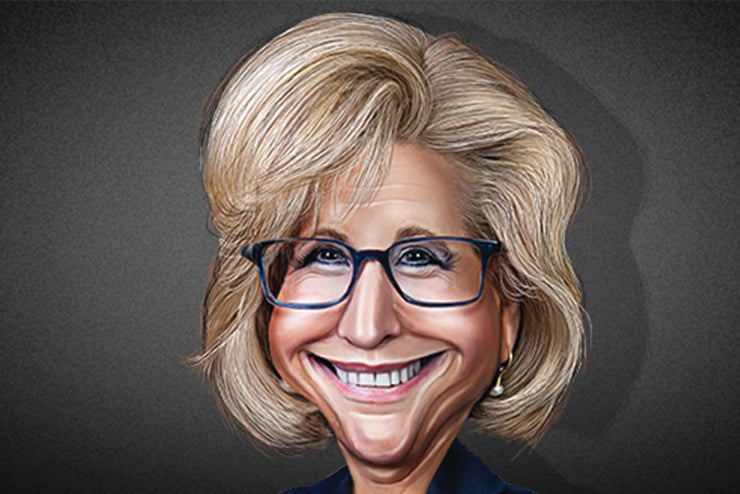In the darkest days of 2021, many demoralized Americans (including this author) failed to see how events could ever line up in their political favor. The Biden regime was ascendant, COVID madness still prevailed, and the Jan. 6 “insurrection” narrative—with its attendant lawfare and censorship—was pushed harder than the drugs at a Diddy freak-off. How could the 2024 election shape up to be anything other than an opportunity for Democrats and regime toadies like Liz Cheney to get performative affirmation of their right to endless power? In other words, Democracy Theater.
Fortunately, however, Democrats never fail to be themselves.
The champions of “Our Democracy,” had already provoked the ire of rank-and-file Democratic voters in 2016 when they bypassed the surging candidacy of Bernie Sanders in favor of the monied candidate, Hillary Clinton. So in 2024, when after a long season of demanding solidarity on behalf of a man who was clearly non compos mentis they then foisted upon them the candidacy of the least-popular contestant in the 2020 primaries, Kamala Harris, the reviews for this version of Democracy Theater were bound to be bad.
Democrat hypocrisy is so widely expected by people on the right that it seldom sparks interest. But for many people less conversant with Democrat perfidy, it was harder than usual not to notice it. After all, this was a strange kind of democracy they were being asked to defend.
Not that many didn’t try—such is the fear and loathing of Donald Trump in the minds of these loyal regime subjects.
In the end, however, it didn’t work.
On Jan. 20, 2025, Donald J. Trump will be inaugurated the 47th president of the United States, just as he was inaugurated it’s 45th—because he was actually, resoundingly, and democratically elected.
Still, it’s worth asking why a manufactured panic over democracy is the go-to play for Democrats whenever confronted with opposition that successfully points out the unpopularity of their policies. Could it be because their policies don’t come from the people? In other words, they are not arrived at democratically. Democrats do not deign to explain their policies or seek, thereby, to make them more popular. Instead, Democratic policies are contrived by “experts” who are said to know what is good for us. Support for these experts is taken as proof of inherent goodness and intelligence, just as opposition is proof, if not of stupidity, then of affinity with Hitler. Pick one.
An opponent cannot be said merely to disagree with Democrats—he is beyond the harmless offering of inferior plans and unworkable solutions. Indeed, it cannot even be that an opponent is simply mistaken about what Americans really want. No, this person must be said to represent ideas so heinous and untenable, so antithetical to the American way of life, that he is a threat to democracy. This method of opposing Republican candidates reached its nadir with Donald Trump, but the habit of confusing policy disagreements with existential regime-level questions is not new at all. One reason it’s not new, of course, is because until recently it has been effective.
But there’s more to this phenomenon than just overheated political rhetoric. There is also a small grain of truth in it, at least when understood from the twisted perspective of a conservator of this current regime, which is America in name only. These “new conservatives” (is there a better name for this coalition of woke leftists, establishment Democrats, and neoconservative former Republicans?) want to conserve the America that spirited away the substance of our Constitution through the courts and secured the power of their class—as they thought, forever—in the administrative state. When they talk about saving “Our Democracy” what they mean is that it is theirs, not yours. You aren’t part of their “Our.” You are the ones they mean to protect it from.
This is why policy disagreements are no longer considered fair game in American politics. Your consent is not required for policy decisions about which “the science is settled” by the wisdom of our betters. Assent or be demonized. Is it a wonder, then, that so many former friends and even family members decline to speak to Trump supporters or that they behave in such unhinged ways when they lose? It is essential to the regime apparatchiks that they be made to believe you are a fascist and want to harm them. This, and petty obsessions over perceived slights to their “identity group,” is how the regime keeps the proles occupied now that they are no longer needed to engage in work of self-government. The more they rage at you, the less time they have to examine the ways the regime harms them while advancing its own interests.
As we come to close of 2024, it seems Democracy Theater may have had its last run—at least for the time being. This is not to say that the producers won’t attempt to make a sequel. For now, the 2024 election stands as a powerful and, we may hope, lasting rebuke, not only to these “new conservatives” but to the regime they endorse as a replacement for our birthright as Americans. May we continue to rebuke them as we get on with the work of rebuilding our democracy as it was intended.
—Julie Ponzi

Leave a Reply